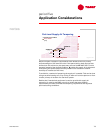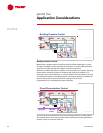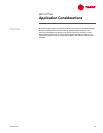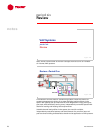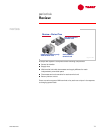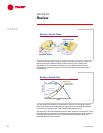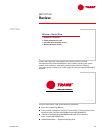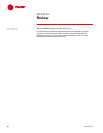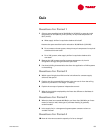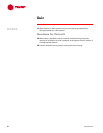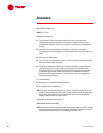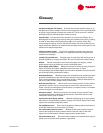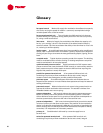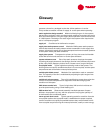
TRG-TRC014-EN 89
Glossary
constant-volume fan, packaged so that the airflow paths are in series.
This provides a constant volume of supply air to the space when operating.
static regain duct design method Method of designing an air duct system
that strives to maintain a fairly consistent static pressure throughout the entire
duct. Recommended for sizing the supply ducts upstream of the terminal units
in a VAV system. The design of a static regain duct system often requires the
use of a computer program.
supply air Conditioned air delivered to a space.
supply duct static-pressure control Method of VAV system static-pressure
control that mounts the static-pressure sensor somewhere in the supply duct
system, allowing the supply fan to decrease speed and lower the static pressure
in the system under part-load conditions.
supply duct system Transports the primary air from the central air handler
to the VAV terminal units and then on to the space diffusers.
system resistance curve Plot of the static pressure drop that the system
(including the supply ductwork, duct fittings, terminal units, diffusers and return
grilles, coils, filters, dampers, and so forth.) creates over a range of airflows.
unoccupied mode Typical nighttime operating mode of the system. The
building does not require ventilation because it is not occupied, and the space
temperatures are controlled to unoccupied set points.
variable-pitch blade control Method of fan modulation used on vaneaxial
fans. The capacity of the fan is modulated by adjusting the pitch angle of the
actual fan blades.
variable-air-volume system Type of air-conditioning system that varies the
volume of constant-temperature air supplied to meet the changing load
conditions of the space.
VAV reheat terminal unit Type of single-duct VAV terminal unit that can
provide space heating using a small heating coil.
VAV terminal unit Sheet-metal assembly installed upstream of space
diffusers. Its purpose is to vary, with the purpose of varying the quantity of
air delivered to the conditioned space.
warm-up/cool-down mode Typical operating mode for transition from the
unoccupied mode to the occupied mode. It establishes the space occupied
comfort conditions as rapidly as possible because they were allowed to drift
from occupied set point during the unoccupied mode, usually to save energy.



